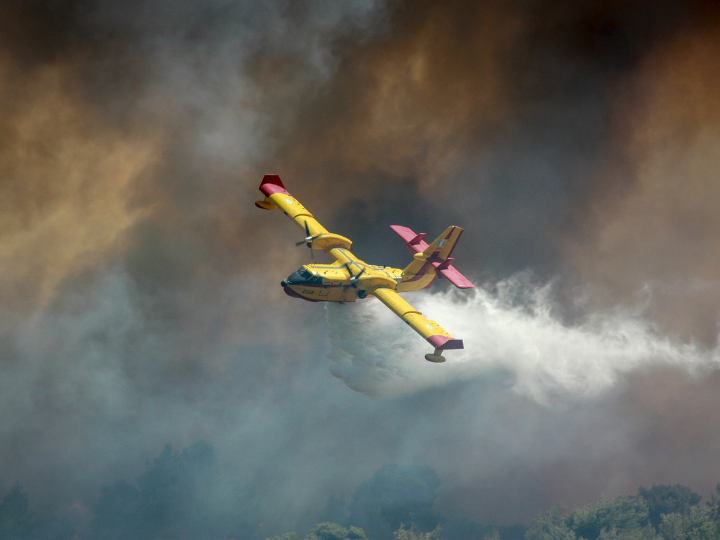by Eliza Gkritsi and Sarantis Michalopoulos
By only focusing on firefighting without a prevention-focused holistic approach, it will be hard for the EU countries to face future wildfires, an expert from Greece, where thousands of hectares of forest were again burned in a couple of days, told Euractiv.
Greece has a long history of wildfires. A wake-up call was in 2018 when a fire in the Attica region killed 100 people.
Since then, the death toll has never reached this level, but the ecological impact has not reduced: 2023 saw the single largest forest fire in EU history in northern Greece, which burned 770 square kilometres, about the size of New York City.
Almost every summer, Greek politicians bicker over fires’ management but on a policy level, there is still progress to be made, the Commission said in a 2024 report.
This summer saw some tangible changes in how Greece deals with wildfires. Helicopters surveilled high-risk areas, over half a million people cleared out land they owned from biomass that could act as fuel, and 25 drones were deployed surveilling the Attica region for wildfires.
Moreover, in March, the government bought seven more firefighting planes for €361 million – which often cannot fly over wildfires due to high winds and smoke plumes.
Greece also launched a €415 million fire prevention program called “AntiNero,” which included, among other things, cleaning pine forests of needles on the ground and improving forest roads that are crucial to reaching affected areas during a crisis.
But none of this stopped last week’s wildfire from razing 20km and reaching the Athens suburbs. One person died, over 100 houses were destroyed, and an estimated 10,000 hectares of forest were burned.
The climate conditions were particularly dire. Greece experienced record-breaking heat in June and July, and strong north winds pushed the fire towards Athens.
Copernicus and the European Forest Fire Information System reports suggest that the Attica region has lost 37% of its forest area in the last eight years.
This summer, fires in Greece have so far been detected early, however this was not enough. Facts showed that once the fire was started, it was extremely hard to put it under control.
For Ilias Tziritis, WWF Greece’s forest fire operations manager, this is due to the lack of a national forest fire management and prevention plan.
Need for a national forest fire management
Tziritis said in Europe, in general, there is a need to focus on landscape management to face future wildfires.
“The scientific community agrees that fires are a matter of landscape management. We have a Mediterranean mosaic; how do we maintain it? We have a decrease in livestock and agriculture in an area, we need to help it to reduce fuel”, he said.
According to the expert, a holistic bottom-up approach involving all relevant stakeholders, from farmers to local community should be put in place. He cited several examples across the bloc where coordination led to results.
Referring to livestock, he said its disappearance from an area means that after a few years, we will have a greater intensity of fires.
“In Spain, there are programs that use livestock farmers to enter controlled areas to reduce fuel, graze there to manage vegetation”, he said.
In Greece, grazing fires are a frequent phenomenon despite recent government measures making fines stricter when it comes to arson by negligence.
“In the island of Andros, 90% of fires are grazing fires […] Greeks should explore Corsica’s case, as a grazing plan using fire was put in place, burning altogether but in a controlled way”.
The expert insisted that the available fire management budget be re-directed to prevention, as Portugal did in 2017 when a national forest fire plan was decided and increased prevention funding to 40%.
Tziritis explained that Greece had never had such a plan or an analysis of the causes or drivers of fire. He also warned that if the authorities do not act, many places across the country—which have been burnt more than two times—will be deserted.
“Some ecosystems will never recover, and there will be consequences for water and air quality as well as tourism”, he concluded.
According to an EU spokesperson, supporting Greece in climate change adaptation and managing climate-related risks is one of the most important priorities for the 2021-2027 Cohesion Policy programmes, with a budget of around €1.56 billion.
“Of this amount, €421 million is specifically dedicated to measures that support the preparedness, prevention and fighting of wildfires”, the spokesperson said.
In addition, measures included in the Greek recovery and resilience plan (RRP) that directly contribute towards the prevention against and response to wildfires amount to over €800 million.
However, it has not been clear yet how much money has been so far absorbed and implemented in projects.
*first published in: Euractiv.com




 By: N. Peter Kramer
By: N. Peter Kramer
